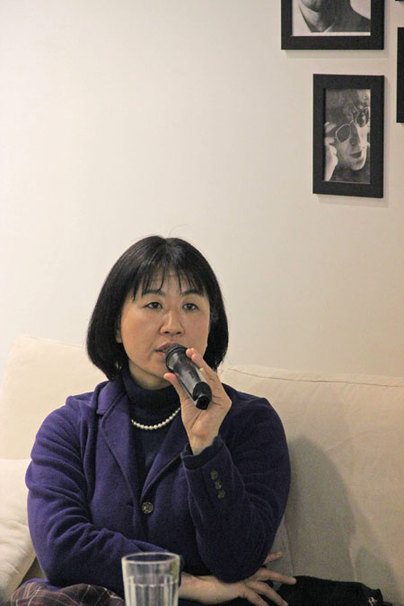At home in Chinese
Updated: 2012-04-10 08:04
By Mei Jia (China Daily)
|
|||||||||||
|
Japanese writer Hifumi Arai is popular in China. Mei Jia / China Daily |
If there's one thing Hifumi Arai can't give up, it's writing.
To that end, the 50-year-old Japanese writer travels extensively, constantly switching between three languages.
As a contributor to mainstream Canadian newspapers, Arai writes in English. In China she is recognized and much loved for her Chinese creations.
Critic Zhi An believes Arai is probably the only non-native speaker of Chinese capable of writing creatively in the language. Her books, mainly collections of short stories and essays, attract a large readership, cutting across age groups. They love her honesty and insight in describing cross-cultural experiences.
Three of Arai's books brought out by Shanghai Translation Publishing House have sold at least 100,000 copies.
Arai believes the key to writing well in a foreign language is to be truthful to oneself.
When she was in Canada, "I had to keep three dictionaries opened simultaneously in my mind," she says.
"Multi lingual writers have a different readership for each of the languages they write in," she says. "But my principle is to write about truth and my true feelings, no matter who I'm talking to and what language I use."
Sometimes, Arai says, her Chinese writing is enriched by thinking in English.
The Toyko-based writer teaches Chinese at Meiji University, and produces roughly 3,000 Chinese characters a day, contributing to five columns in different media.
Arai was born in Toyko. Her first name, Hifumi, literally means one, two and three. It signifies her birthday, on Jan 23.
Her romance with the Chinese language began at 19, when she discovered the writer Lao She as part of a language program at Waseda University. It was perhaps inevitable that she would land up in China after graduating from Waseda in 1984.
She was taken by the writings of Lu Xun and Eileen Chang, seeing the former as her teacher and the latter as her idol.
"I was really amazed by the power of Chinese. The language seemed to be wildly different in the hands of Lu Xun and Chang, in style, imagery, and concept," she says.
"Lu Xun's language differed from that of the ancient Chinese, unlike Wang Shuo, whose writing is loaded with local tones," she says. "The freshness in Lu Xun's writing is shared by me, a Japanese writing in Chinese."
"Both of us use a new language to write," she adds.
She empathizes with Lu Xun, who gave up medicine to dedicate himself to a life of writing with a view to arousing the nationalistic spirit in the Chinese.
"I'm Japanese. My people caused pain to the Chinese," she says. "The anguish comes out the strongest in Lu Xun's works, rather than in a book of history. Lu Xun made me revisit my country's history."
Arai left for Canada in 1987, beginning a career as an author, writing about Japan and her immigrant experience in English for six years.
In 1994, Arai moved to Hong Kong and became a columnist, writing in Chinese. In her articles she combined delicate personal feelings and social comments, approaching these with a sense of humor. Her writing was invested with traits of both Chinese and Japanese languages.
In 1997 she was back in Tokyo, beginning a new life, raising kids, teaching, writing, and baking. Raising children made her mature and evolve into a responsible human being, she says.
"I didn't get along well with my mother when I was young. I think my writing and travels are a way of escape from my frustration with that chapter in my life," she says.
However, raising kids helped her to look at the positive side of things. "If you do not consider it a chore, raising kids can inspire creative thinking, she says, adding that the process helped her to see a connection between life and art.
In her forthcoming book, Beer at 4:00 PM, Arai talks about a slow-paced life, and its artistic side.
Speaking Chinese has its benefits, she says, even outside of China. Her kid had fallen ill on one of their travels to Malaysia. Besides communicating in English, she repeated her worries to the doctor, a Chinese-Malaysian, in the Chinese language and he understood her perfectly.
"I'm really happy about speaking a language that is increasingly popular and handy to use," she says, "and I love how friendly the Chinese people can be with strangers."
Arai is traveling less than she used to. "But I keep traveling as a I write or cook. I recreate the dishes I tasted abroad, and tend to draw fresh inspirations from memories of earlier travel."
meijia@chinadaily.com.cn
Today's Top News
Rescuers race against time for quake victims
Telecom workers restore links
Coal mine blast kills 18 in Jilin
Intl scholarship puts China on the map
More bird flu patients discharged
Gold loses sheen, but still a safe bet
US 'turns blind eye to human rights'
Telecom workers restore links
Hot Topics
Lunar probe , China growth forecasts, Emission rules get tougher, China seen through 'colored lens', International board,
Editor's Picks

|

|

|

|

|

|






